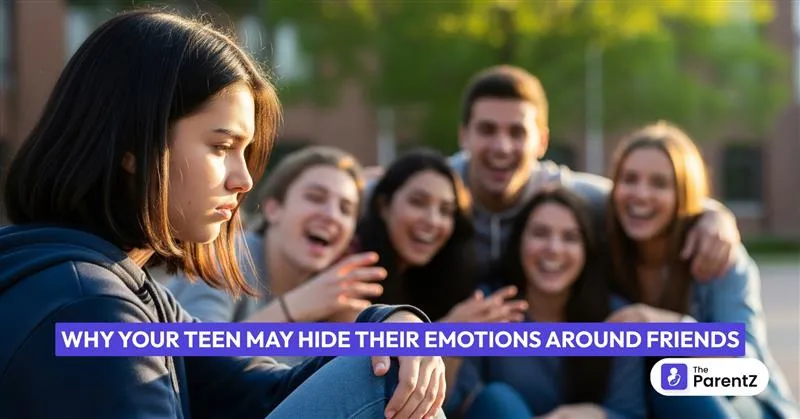Your teen comes home from hanging out with friends, and you ask how it went. "Fine," they mumble. But you can tell something's off. Maybe they seem upset, or overly excited about something, yet when you ask if they talked to their friends about it, they give you that look. The one that says you just don't get it.
You're not imagining it. Most teens do hide their real emotions around their friends, even their closest ones. And no, it doesn't mean they're not actually close. It's way more complicated than that.
The Social Tightrope Your Teen Walks Every Day
Picture this: your teen is excited about getting into the school play, but they don't tell their friend group. Or maybe they're devastated about a family situation, but they act like everything's perfect when they're with friends. Why would they do this?
From a teen's perspective, friendships feel like walking on a tightrope. One wrong step, one moment of being "too much," and everything could change. Your teen isn't being dramatic when they think this way. At their age, social connections feel like everything because, in many ways, they are everything to them right now.
It's Not About Trust; It's About Timing and Safety
When you were a teen, maybe you told your best friend everything. But today's teens face different pressures. Social media means there are no private moments. What feels safe to share at 3 PM might feel terrifying by 7 PM when the group chat is buzzing.
Your teen might want to share that they're struggling with anxiety, but they're waiting for the "right moment." Except that moment never seems to come. There's always someone else's drama, or the conversation moves too fast, or suddenly it just doesn't feel safe anymore.
The Fear of Being "Too Much"
One of the biggest reasons teens hide emotions is the fear of being seen as too intense, too needy, or too dramatic. They've probably seen what happens to the kid who shares too much. Maybe that person got labeled as "the one with problems" or became the group's unofficial therapist. Your teen doesn't want that role.
So when they're really happy about something, they might downplay it because they don't want to seem like they're bragging. When they're upset, they pretend everything's fine because they don't want to be the downer. When they're angry, they stay quiet because angry girls are "crazy" and angry boys are "aggressive."
The Group Dynamic Problem
Here's something many parents don't realize: teen friend groups have unspoken rules about emotions. Maybe the group's thing is being chill about everything. Maybe they bond over complaining about school, but never talk about real problems. Maybe there's an unspoken competition about who has it together.
Your teen has figured out what emotions are "allowed" in their group and which ones aren't. They're not being fake, they're being smart about handling complex social rules that adults often don't see or remember.
The Weight of Being the "Strong One"
Many teens get stuck in a role within their friend group. If your teen is seen as the responsible one, the funny one, or the one who has it all figured out, they might feel pressure to maintain that image. Breaking character by showing vulnerability feels like letting everyone down.
They might think, "If I tell them I'm struggling, they won't know who to turn to when they need help." The pressure to be everyone else's rock means hiding when they need support themselves.
It's Different from Your Generation
As a parent, try to remember that your teen's social world looks nothing like yours did. They can't just walk away from a conversation that goes wrong. Screenshots exist. Group chats continue without them. Social media means everyone knows everyone's business.
When you were young, you might have had one or two really close friends you told everything to. Your teen might have a larger group where intimacy works differently. They might share some things with some people and other things with others. It's not less meaningful - it's just different.
How You Can Help (Without Making It Worse)
- First, stop asking why they don't just tell their friends. Instead, try: "That sounds really hard to deal with on your own." This shows that you get that sharing isn't always simple.
- Create space for them to process emotions at home before they figure out what to share with friends. Your teen might need to understand their own feelings before they can safely share them with anyone else.
- Don't make their friendships the villain. Comments like "I thought you were close" or "Real friends would understand" just make them feel more alone. Their friends aren't bad; the situation is just complex.
Conclusion
Your teen isn't hiding emotions from friends because they don't trust them or because the friendships aren't real. They're doing it because they're trying to go through a social world that feels high-stakes and unpredictable. They're protecting themselves and their relationships in the best way they know how.
The goal isn't to get your teen to share everything with their friends. The goal is to make sure they have somewhere safe to be real, and that place might be with you, if you can understand their world without trying to fix it.
Sometimes the best thing you can do is listen without judgment and resist the urge to solve their social problems. Let them know that hiding emotions sometimes makes sense, and that you're there when they need a place to take off the mask.





Be the first one to comment on this story.